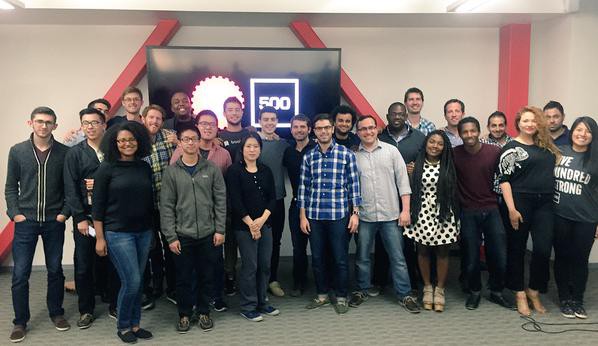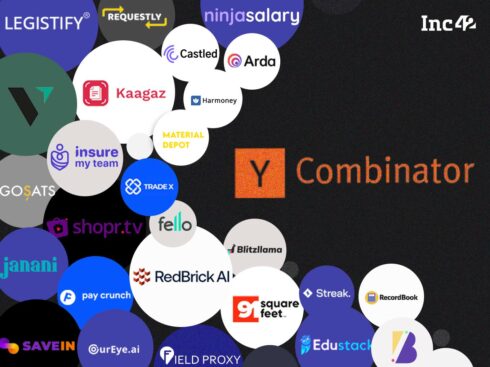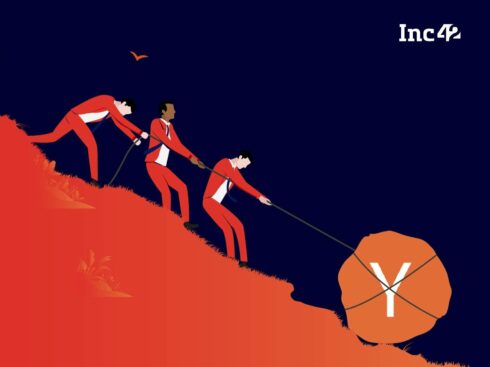I led the final week of the program where, in addition to 60-second pitch workshops, Angel.co profile show-and-tell, and pitch deck review sessions, I organized mock accelerator interviews.
To help me, I called a few of my friends*, Ryan Jackson of Paid and Andrew Norris of Taplytics, both YCombinator alums, Mason Blake and Tristan Pollock (now EIR @500) who went through AngelPad, and Selcuk Atli and me from 500Startups (both of us with YC backgrounds).
We started with a panel introducing ourselves and the accelerator processes: YC does 10 minute interviews with a few partners and cares more about founders than ideas; 500 does a deeper dive over 20–30 min and focuses on people and growth. With Angelpad, you’ll be talking to Thomas and Carine, and there will be fewer companies in your cohort. Each pre-accelerator company then had a 5-minute mock interview with us.
Despite the differences between us and our accelerators, the six of us noticed very similar patterns in the founders. The following mistakes to avoid and advice will help you prepare for any accelerator interview (and some investor conversations, too!)
Most Common Mistakes:
1) Over-talking
Most common mistake: over-explaining product, technology, everything. Tangents. Doing a full sales pitch. Remember you are getting people excited about your business, not trying to sell them your product.
2) Defensive answers and body language
Under duress of a tough question or interviewer, many people become visibly stressed, nervous, verbose — their postures change, their voices speed up, they over-talk and under-listen.
3) Strange co-founder dynamic
This is really important. Nothing worse than seeing co-founders disagree, interrupt one another, or have one founder completely dominate while the others sit in silence (looking at you, “CTOs”).
4) Not telling a story
Or, telling the wrong stories. Or, taking forever to tell a very simple story. Clinical “problem — solution — market — traction” pitches are so forgettable. Not having any prepared user stories.
5) Losing control of interview
These are the cringe-interviews where founders surrender into reactionary mode and have to go on the defensive. We’ve all been there.
6) Not being able to talk differentiation
Being “marginally better” is never good enough. “Design” was also an answer that fell flat. Some people talked too highly or too much about competitors.
7) Terrible energy
Founders with low energy make interviewing not fun at all. We had quite a few companies who didn’t bring any energy, aliveness, or personality to their interviews.
No assholes. No BS. – Selcuk
Our advice
1) Be brief.
Nail your elevator pitch. If I have to spend 10 minutes figuring out what you are doing — you’re not getting in. – Andrew
Nail the elevator pitch — less than 20 seconds: what do you do, who is your target market, why is this rad? Ryan gave this example format: “We are Paid, Autopilot for Accounts Receivable. We help companies invoice their customers and get paid with 200% return on their ROI.” They apparently like the “X for Y” over at YC. Whatever you do — make sure it’s clear. Remember to say your company name. In all following questions, answer the question as briefly as you can. Avoid tangents. Don’t make us interrupt you. If you are in a Skype or remote interview, this advice is even more important.
Answers before explanation. – Ryan
2) Know your trigger questions. Breathe.
Know your nervous ticks, too. Talk too fast? Jiggle your leg? Identify the top questions, personality types, and factors that give you anxiety. Defensiveness comes from stress and lack of mindfulness. Take a breath before answering a question. Accelerator interviewers want to know you are coachable, so defensiveness during an interview is a horrible signal. Stay in control.
Be aware of the story you are telling with your body, not just your words. – Andrea
3) Be a team. Plan founder contributions.
First of all, unless totally necessary, don’t correct or interrupt your co-founder (unless they aren’t following #1, then perhaps a team-agreed signal or nudge). Be a team. Address any tension before heading into an interview.
Every co-founder should speak during an interview. It’s fine if someone takes charge, but all founders should be ready to contribute. Interviewers may single out people in the team, so every co-founder should be able to articulate the basics.
Be careful to not fall victim to the “Eye Contact Problem.” They will always be looking at the last person who spoke, but they don’t have to be the one to answer. – Ryan
Before an interview, assign question categories, like “Maria will take fundraising, business, and sales. Pablo will take anything technical and tell our user story, and Jenn will take questions about competitors, differentiation, and market.” If you have a team with previous exits, baller backgrounds with great companies, or any amazing feats, be sure to mention them. If you find it hard to brag about yourselves, empower each other during the interview.
Bonus points: I always ask “How did you all meet?” Most investors want to bet on strong c0-founder relationships that can withstand the tough times. A few of the teams we interviewed laughed, looked at each other, waited for the other to speak, started talking at once, then sentimentally reported the “story of how they met.” I call this the “newlywed effect,” and it’s something that I appreciate very much.
4) Know your story.
On a macro-level, this applies to your company: what is genuinely interesting about your story as a product, as a team, in your space? Have you learned anything? Why are you doing this? On a micro-level, this applies to how you will talk about your traction and value proposition: what’s a great customer or user story? Come prepared with data, results, or a story that will surprise us, overturn an assumption we have, or inspire us. And, be able to tell your stories succinctly. All great stories can be told in under a minute, and some only need 20 seconds or less.
Avoid marketing speak. No synergy. No disruption. No bullshit. – All of us
5) Prioritize Top 3 things.
There are tough interviewers and investors out there who will try to dominate and intimidate you. Along with your simple, short elevator pitch, also come prepared with the three things you want to cover before the interview is over, for example: differentiation within your market, traction (which, if you have, talk about as soon as possible) and team backgrounds. Interviews can span a few minutes to half an hour, but knowing YOUR agenda will help ensure you don’t get trapped in someone else’s line of questioning or run out of time before your startup’s best can shine. If you get derailed, you can maneuver back to your Top 3. We also suggest knowing the Top 3 things that you DON’T want to bring up, but we also warn that these things might actually belong on your Top 3 list.
6) Be more than marginally better.
Differentiation is key. If you are entering a crowded space or have robust competition, this is Concern #1 on every interviewer’s mind (looking at you social networks, sales automation SaaS, food delivery, etc.) There is a reason you started your company. You may not know it yet, but there is. As an early stage company, it’s hard to know what your “moat” or “secret sauce” is, but you should avoid describing your company’s advantage in terms of features, slight advantages, user experience — instead, describe in simple language the value that your customers and users get from your service. Describe the vision of what you are building toward.
Being marginally better than your competitors is not enough — really need to have a key differentiator, a reason to switch, something you do MUCH better – Mason
7) Bring your best self.
Understand that your interviewers will be talking to many companies in one day, one after another, for hours. They can all easily blur together. If you have low, uninspiring energy, your traction better be fucking incredible. There’s nothing more inspiring than a founder who is passionate about what they are building, their mission, their team, their customers. Pump yourself up with music, go to a morning rave, read the journal entries from the day you quit your job to become an entrepreneur — do whatever it takes to bring your most authentic, alive self to your interview. Your only job in an interview is to make someone in that room excited about you and your company.
Make the interviewer generally excited, and energize the room. Confidence without delusion – Selcuk




























